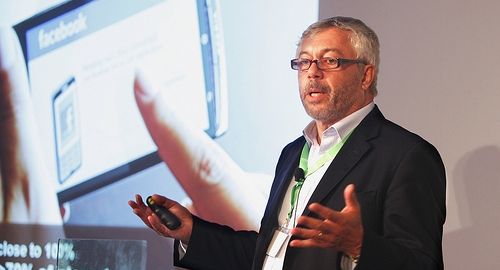Good afternoon, ladies and gentlemen,
It is a real honor for me to be invited to the ICCO Summit and to have the opportunity to share my thoughts with such a distinguished assembly, “la crème de la crème” of the PR and Communication Industry.
I appreciate how brave the organizers are for asking me –I have only been working in PR for two years after all ‐ to discuss “HOW WE MAKE THE FUTURE BRIGHT FOR PR” after the best PR experts have presented their views during the last two days. I feel like Liz Taylor’s eighth husband: whatever he said or did probably had a sense of “déjà vu”.
Maybe, they thought of me because I have spent the last 18 months building a global PR and Event Agency: MSLGROUP is now, according to the Holmes Report, the N°4 global network in this field when we integrate Schwartz Communications, our latest acquisition in the United States.
Or maybe is it because I have also been in charge of a global advertising agency, Publicis Worldwide, and I have spent fifteen years in media, managing and transforming the business model of newspapers to adapt them to a more and more digital world. They might have thought that I can offer a new and fresh perspective on the Communication world and its future at a time when senior managers of the industry would instinctively think that a change or a reset is needed.
Anyway, I am sincerely delighted to have this opportunity. I have already learned a lot thanks to all the very interesting speakers I have listened to during this Summit. And I will try to summarize key ideas with my own words. Before going further, let’s watch a short video.
Yes, what would you have done when your clients are confronted by major crises like those we just had a glimpse of? The irony is that the greater the trouble the brighter our future should be. But, we all agree, I suppose, that managing the reputation of companies and building strong brands is more and more complex.
What I would like to do now is:
- To look at a few shockwaves that have impacted our companies and societies recently. It is my feeling that they are changing the way we live, the way we work in a much more forceful way that we usually admit. I think that Americans, Europeans, and Japanese, in other words people that were ruling the business world 20 years ago have not completely grasped how profound these transformations are and have barely changed the way they live or work when much more radical initiatives were, and are still badly needed. One shockwave is what I call "the 3 billion new traders” challenge. Another one is the “1 billion journalists” challenge. And a third one is the “9 billion survivors” challenge.
- Then I will share with you what I think the consequences of these major shifts could be for our industry, the kind of services we should be providing if we want PR not only to be at the heart of, but to lead the marketing and communication practice.
So let’s start with the “3 billion new traders challenge”.
To me, the biggest earthquake of all times, in living memory, has happened in a relatively short period of time, in the grand scheme of things, roughly between 1980 and 2000. And we are still seeing its aftershocks happening almost every day.
It actually started in 1979, when Deng Xiaoping visited the US, met Jimmy Carter, visited NASA, visited the Boeing headquarter in Seattle as well as Coca‐Cola HQ in Atlanta. He sent then a strong message to his people, members of the communist party, and said: “it is good to get rich”. This was a strong signal and the beginning of an unprecedented 30 year period of growth in China.
In 1989 the Berlin wall falls, the Soviet Union tumbles opening all ex‐soviet republics to international trade and leading to re‐unification of Germany.
In 1991, Manmohan Singh, the then Finance Minister of India launched economic reforms that opened the Indian economy to greater international trade and investment.
In 1992, Fernando Henrique Cardoso was appointed Minister of finance. He crafted a highly successful plan “Plano Real” that granted stability to the Brazilian economy. He managed a smooth political transition with Lula, Brazil jumped on the band wagon of the new Latin America parade.









